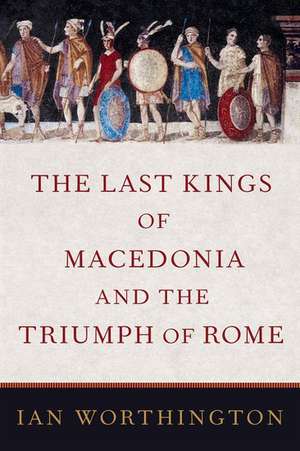The Last Kings of Macedonia and the Triumph of Rome
Autor Ian Worthingtonen Limba Engleză Hardback – 8 iun 2023
Preț: 167.17 lei
Preț vechi: 190.53 lei
-12% Nou
Puncte Express: 251
Preț estimativ în valută:
31.100€ • 34.77$ • 26.90£
31.100€ • 34.77$ • 26.90£
Carte disponibilă
Livrare economică 20-26 martie
Livrare express 15-21 martie pentru 55.14 lei
Preluare comenzi: 021 569.72.76
Specificații
ISBN-13: 9780197520055
ISBN-10: 0197520057
Pagini: 320
Ilustrații: 23 black & white halftones, 7 maps
Dimensiuni: 268 x 132 x 29 mm
Greutate: 0.57 kg
Editura: Oxford University Press
Colecția OUP USA
Locul publicării:New York, United States
ISBN-10: 0197520057
Pagini: 320
Ilustrații: 23 black & white halftones, 7 maps
Dimensiuni: 268 x 132 x 29 mm
Greutate: 0.57 kg
Editura: Oxford University Press
Colecția OUP USA
Locul publicării:New York, United States
Recenzii
The Macedonian king Philip V is usually remembered as the man whose alliance with Hannibal triggered the Roman expansion in the East. Drawing upon epigraphic discoveries of the last decades that document Philip's military and administrative reforms and responses to crises and correct the hostile account of the historian Polybius, Ian Worthington has composed a nuanced and up-to-date narrative of a life that started with ambitions and triumphs, and ended with defeats and tragedies. Philip's actions generated a process that Polybius calls symploke: the entanglement of political developments in Europe, Africa, and Asia. With this book, he now takes the place that he deserves among the greatest protagonists of the Hellenistic Age.
A brilliant and much-needed volume on the last kings of ancient Macedonia. Worthington duly gives Philip V, Perseus, and Andriscus (Philip VI) the attention they deserve, challenging the view that they are mere 'postscripts' to Macedonia's Classical past and losers in the fight for supremacy in the second century BC Mediterranean. This updated history will undoubtedly foster interest in the last Antigonid kings and revise our understanding of the conflict between Macedonia and Rome.
[The book] may be enjoyed by a general audience, but also profitably read by undergraduates as a scholarly introduction and graduate students as a brisk refresher to one of the most important, if doomed, dynasties of the Hellenistic world.
A brilliant and much-needed volume on the last kings of ancient Macedonia. Worthington duly gives Philip V, Perseus, and Andriscus (Philip VI) the attention they deserve, challenging the view that they are mere 'postscripts' to Macedonia's Classical past and losers in the fight for supremacy in the second century BC Mediterranean. This updated history will undoubtedly foster interest in the last Antigonid kings and revise our understanding of the conflict between Macedonia and Rome.
[The book] may be enjoyed by a general audience, but also profitably read by undergraduates as a scholarly introduction and graduate students as a brisk refresher to one of the most important, if doomed, dynasties of the Hellenistic world.
Notă biografică
Ian Worthington is Professor of Ancient History at Macquarie University. His many publications include Athens after Empire, Ptolemy I, By the Spear, and Demosthenes of Athens and the Fall of Classical Greece. He has served as Editor-in-Chief of Brill's New Jacoby since 2003, and in 2019 and 2020 was elected a Fellow of the Royal Historical Society (London) and the Society of Antiquaries (London), respectively.
